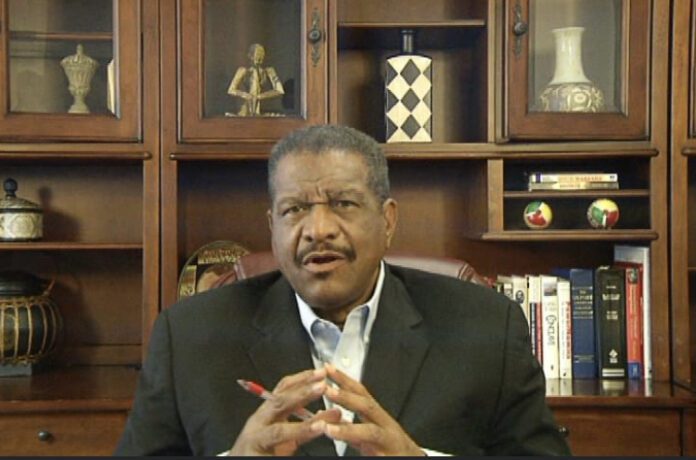On Tennessee 222, between the Stanton, Tennessee business district and Interstate 40, rising steel girders portend a probable monumental change for this rural Haywood County village of about 500 residents on U.S. 70-79 about 50 miles northeast of Memphis.
The girders eventually will be the home of Ford Motor Company’s BlueOval City, the automaker’s $5.6 billion looking-toward-the-future plant that will produce all-new electric trucks and the batteries to power them.
The surrounding Black farmers and landowners want to be able to benefit from the economic development opportunities that sprout from BlueOval City while also protecting farmland their families have owned for generations.
Members of these stakeholders will hold a press event Monday (June 26) to announce strategies for collaborating with the BlueOval City project.
The announcement is scheduled for 11 a.m., at Greater Fredonia Baptist Church, 280 Fredonia Road, in Stanton.
“Ford Motor Company is presenting an incredible opportunity,” said Black Farmers and Agriculturalists Association (BFAA) President Thomas Burrell. “In the 20th century, we left the cotton fields to go up north to work for the automobile industry. Now, the industry is coming here to the cotton fields.
“We need to get our house in order and be ready to get some of those contracts.”
Burrell said 75 farmers, landowners, and community leaders will advocate for cooperative actions to create generational wealth.
“These men and women own thousands of acres of land where the BlueOval City project is being constructed,” said Burrell. “We envision joining forces to create wealth that will be passed down through our generations. We are seeking to incorporate and establish a more powerful position of economic development.”
Rather than individual landowners selling land by the acre, Burrell is advocating for a partnership with BlueOval City to have hotels, apartment buildings, warehouses, green spaces, and office buildings to be built on land where owners have retained ownership.
Burrell did not specify any area or parameters he is looking to incorporate.
Black landowners, however, have expressed concern about the Tennessee Department of Transportation’s plan to take some of their land through eminent domain.
TDOT plans to build a new highway through rural Fayette, Tipton and Haywood counties in a project that also includes a new Exit 39 interchange on Interstate 40 as part of 13.7 miles in roadway improvements.
Steven Reid of BlueOval City Communications said he was unaware of the press conference, but expressed Ford’s intention to be a good, corporate citizen in serving the communities surrounding the project.
Ford issued a statement ahead of Monday’s meeting, which read:
“Ford is committed to being a good neighbor and adding to the prosperity and quality of life in every community where we do business, including in West Tennessee.
“We have encouraged the Tennessee Department of Transportation, which is responsible for public road maintenance and development – including eminent domain scenarios – to meet with impacted property owners and local community groups to quickly reach an equitable resolution.”
The city of Mason is near BlueOval City. One city leader said there are only a few “Black farmers” still in the town. If they are participating in Burrell’s initiative, it will be on an individual basis.
“Thomas Burrell came to Mason to run for mayor when he wasn’t a resident last year,” said Alderwoman Virginia Rivers. “The city of Mason is not connected with Mr. Burrell’s plans, nor do we anticipate becoming involved.”
BlueOval City is expected to employ about 6,000 workers. That kind of localized labor force usually attracts interest from potential national or regional retailers, fast food establishments and businesses. For a city that has lost nearly 32 percent of its population since 2000, according to Census figures, the expected growth could be a blessing and a curse as village ambience meets tremendous growth.
Burrell said the collaborative strategy to “incorporate” is a crucial one.
“Many of the Black farmers have possessed their land for five or six generations,” Burrell said. There is a need for a paradigm shift. It is time for a more equitable solution to bringing inclusion and better opportunities from this $5.6 billion project.
BFAA boasts a membership of more than 20,000. The organization is a Memphis-based, nonprofit, established by Burrell in 1997.
In 1981, a series of protests and sit-ins drew attention to discriminatory practices against African-American farmers by the U.S. Department of Agriculture (USDA). The organization’s activism has won millions of dollars in restitution for BFAA members over the years.
“We grow cotton and soybeans, many of us,” said Burrell. “But this is a huge opportunity to create wealth to extend many generations beyond us. It’s just another way for the land to work for us. The land is our home. Land is the legacy we will pass down to our children. We can’t let this moment pass us by.”



